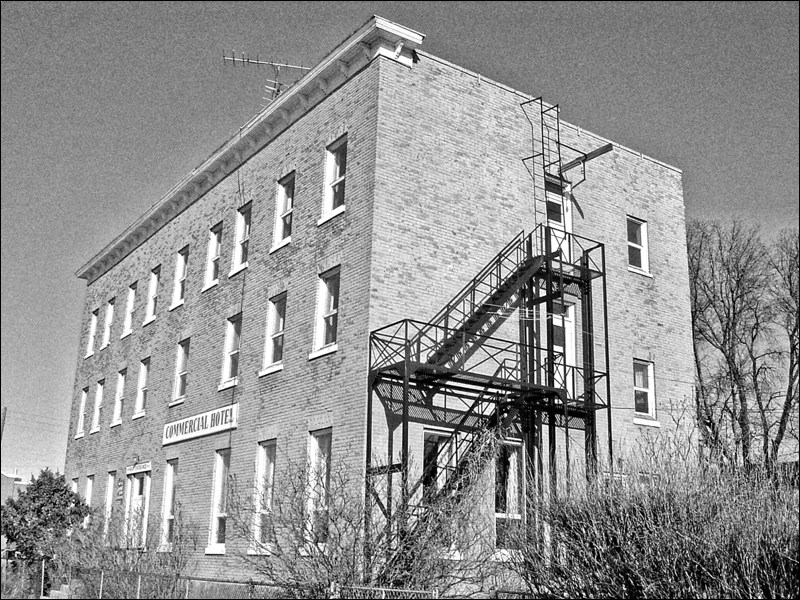Old hotels are full of stories – some of them sad. The Commercial Hotel at Blaine Lake is no exception. Here are a few tragic stories about this still-standing hotel.
In November 1912, a year and a half after Blaine Lake voted to go “dry,” three railway workers died of alcohol poisoning after drinking wood alcohol. It was a Saturday night, and since Blaine Lake was a dry town, the men went to the local drug store looking for an alcohol-based substitute. They told the druggist that they intended to use the alcohol to rub down their horses.
“None survived the resulting consequences,” the Shellbrook Chronicle reported. “Two died in the livery barn and another was found in a granary a few miles away… having died trying to cool his throat and stomach with a mouthful of grain.” This tragic incident led to the end of Blaine Lake’s self-imposed prohibition. The village voted unanimously on Dec. 8, 1913 to go “wet.”
The livery barn where two of the three men died was owned by Keefer Pollard. Trained in carpentry, Pollard had moved into Blaine Lake in 1911 – the year the village went dry. His first project was the livery stable, and when Blaine Lake voted to go wet in 1913, Pollard had already started building the Commercial Hotel. He sold the three-storey brick hotel to A. W. (Willis) Armstrong prior to its completion in 1914. The whole province went dry in 1915, and once more liquor could not be purchased in Blaine Lake until Prohibition ended in 1924.
On June 20, 1925, Dorothy Armstrong found the bodies of her parents, Willis Armstrong and his wife Hannah, owners of the Commercial Hotel, in their living quarters at the hotel. Mr. Armstrong had shot his wife with a .45 calibre revolver and then turned the gun on himself. The coroner’s jury concluded that the tragedy was caused by the effects of homebrew obtained from a bootlegger.
“Should the investigation bring to light the party or parties who supplied the homebrew to the late Mr. Armstrong,” the jury stated, “we ask that they should be prosecuted.”
Dorothy and her 10-year-old brother went to live with relatives in Ontario. John J. Nelson and his wife took over the hotel.
In 1953, Walter and Julia Krewniak bought the Commercial Hotel. They had come to Blaine Lake in 1930 from Ukraine. Julia’s brother, Stanley Bereziak, joined them after the Second World War, and worked as the hotel bartender. While still living in the Ukraine with his wife and two young daughters, Stanley was captured by the Nazis and sent to a German prisoner-of-war camp where he was held for six years. Shortly after his imprisonment, Stanley’s wife gave birth to a daughter, Helen, in their home village in Western Ukraine. About two years later, his wife died, and the three girls had to fend for themselves.
In October 1967, Stanley’s youngest daughter, Helen Bereziak, came to live with her father in Blaine Lake. She worked at the Commercial Hotel, and married Jack Popoff in 1973. Helen eventually became the owner of the hotel through her family connections. Even after it stopped operating sometime in the 1990s, Helen, divorced from Jack, continued to live in the large hotel building. As far as I know, she lives there still.



